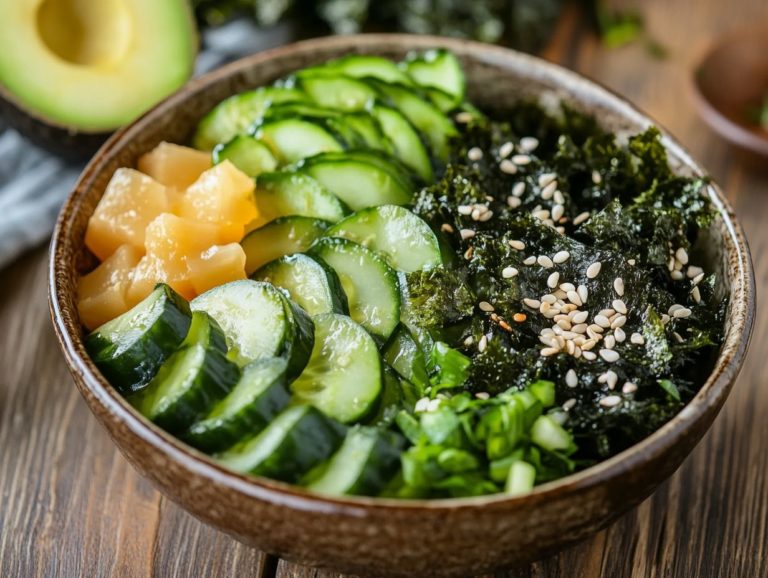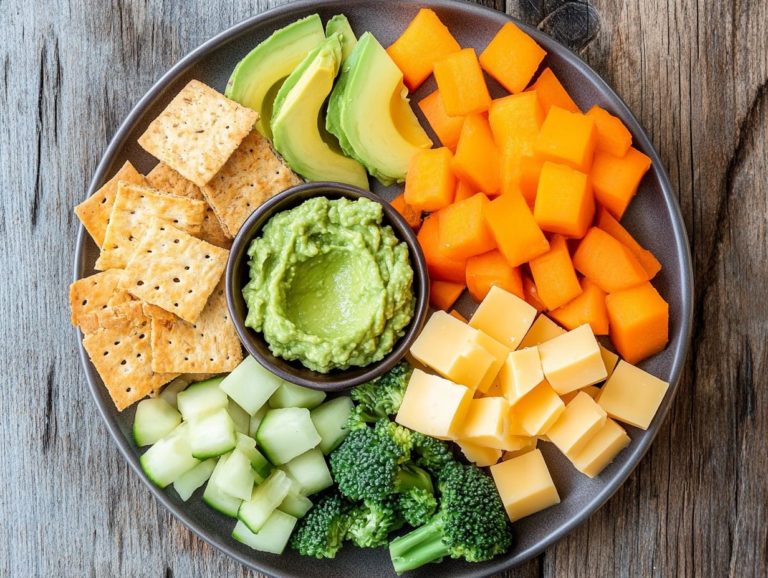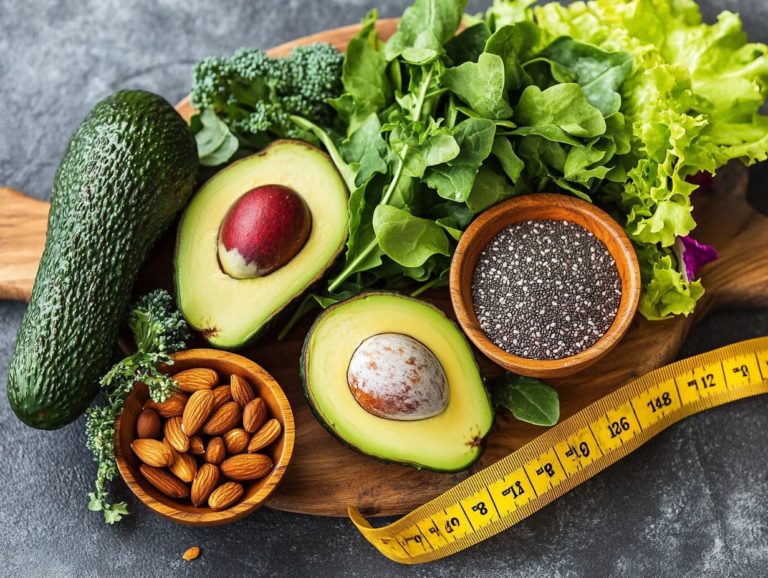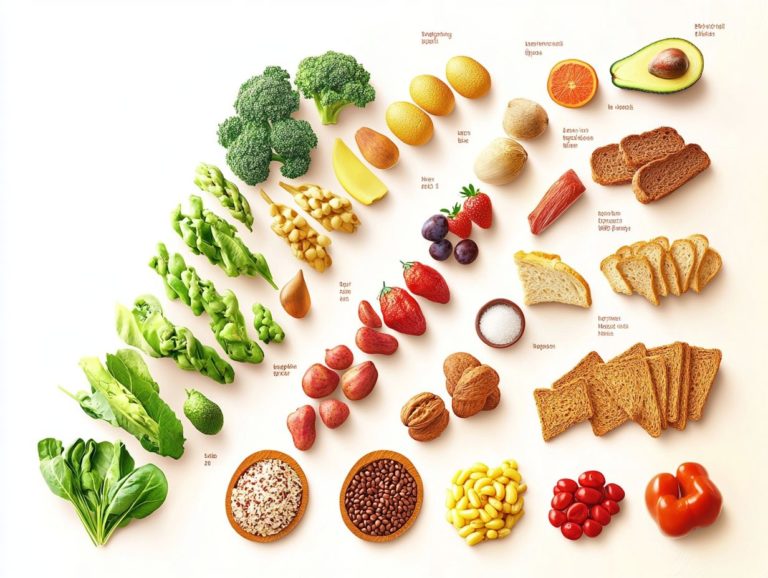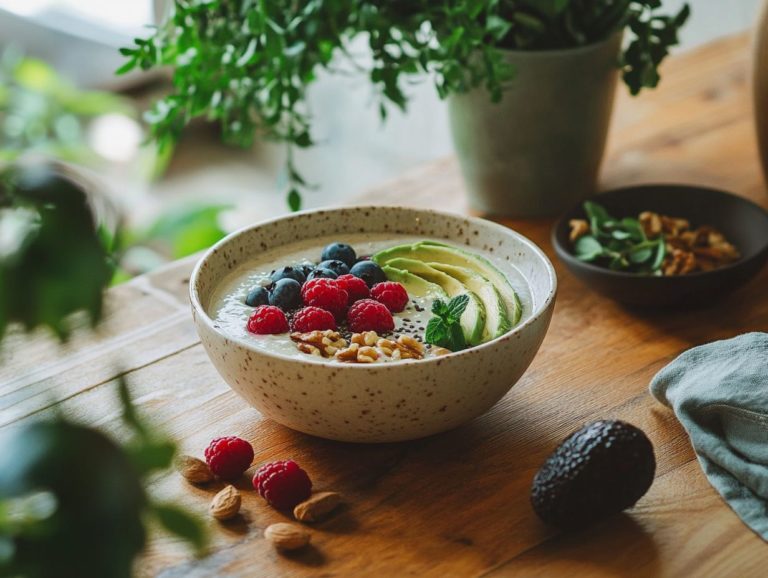Keto-Friendly Sweeteners: Natural vs. Artificial
Contents
- Understanding Keto-Friendly Sweeteners
- What Are the Potential Risks of Using Sweeteners on a Keto Diet?
- Can Sweeteners Increase Cravings for Sugary Foods?
- How to Choose the Right Sweetener for Your Keto Diet
- Experiment and Find What Works Best for You
- Frequently Asked Questions
- What are keto-friendly sweeteners?
- What is the difference between natural and artificial sweeteners?
- Which natural sweeteners are keto-friendly?
- Are all artificial sweeteners keto-friendly?
- Can keto-friendly sweeteners be used in baking and cooking?
- Are there any potential health risks associated with keto-friendly sweeteners?
Understanding Keto-Friendly Sweeteners
Navigating a ketogenic diet often requires you to reassess your relationship with sugar and glucose. Rest assured, you don t have to abandon sweetness entirely.
Whether you re seeking natural or artificial alternatives, keto-friendly sweeteners can effectively satisfy your cravings while keeping you in ketosis. This guide delves into the array of sweeteners available, examining their benefits and potential risks.
We provide tips on selecting the right sweetener to align with your health goals, including understanding nutritional information and dietary guidelines.
Get ready to discover how you can enjoy sweetness without compromising your keto journey!
Key Takeaways:

- Natural sweeteners like stevia and monk fruit offer health benefits and fit well in a keto diet.
- Artificial sweeteners such as sucralose and aspartame provide convenience, but be cautious of potential risks.
- Choose sweeteners based on your health goals. Always read labels and try different options.
What Are Keto-Friendly Sweeteners?
Keto-friendly sweeteners play a pivotal role in the ketogenic diet. They allow you to stick to low carbs while enjoying sweetness without sacrificing your health. These sweeteners effectively manage blood sugar and insulin levels.
Among these options, you’ll find natural sweeteners like stevia and monk fruit, as well as sugar alcohols such as erythritol and xylitol. All offer low-calorie alternatives to traditional sugar.
In a world where health advocates and registered dietitians stress the importance of mindful dietary choices, understanding the sweetener substitutes at your disposal can empower you to manage your blood sugar and insulin levels with ease.
Why Do People Use Sweeteners on a Keto Diet?
Those on a keto diet often turn to sweeteners to satisfy their sugar cravings without derailing their low-carb lifestyle. These sweeteners provide a delicious alternative and offer numerous health benefits that aid in weight loss and enhance metabolic health.
By incorporating low-carb sweeteners like stevia and erythritol, you can indulge in sweet flavors while maintaining a low carbohydrate intake. This choice effectively manages your blood sugar and insulin levels.
This thoughtful approach aligns seamlessly with ketogenic principles, allowing you to enjoy satisfying meals without compromising your health.
Natural Keto-Friendly Sweeteners
Natural keto-friendly sweeteners, like stevia and monk fruit, provide a delightful way to indulge in sweetness without straying from your low-carb lifestyle. These sweeteners elevate your favorite dishes while offering low-calorie options that won’t spike your blood sugar levels.
Incorporating these natural alternatives into your diet supports metabolic health and overall well-being, all while adhering to dietary guidelines that promote healthy choices and mindful eating.
What Are the Benefits of Natural Sweeteners?
Natural sweeteners present a wealth of benefits, particularly for those of you following a ketogenic diet. They offer low-calorie alternatives that can satisfy sweet cravings while promoting your metabolic health. Derived from plants, these sweeteners typically exert minimal influence on blood sugar and insulin levels, positioning them as a favored option for the health-conscious.
By incorporating natural sweeteners like stevia and monk fruit into your diet, you can relish the flavors you adore without the guilt that often accompanies traditional sugar consumption.
These alternatives can play a crucial role in your weight management journey, allowing you to satisfy sugar cravings without piling on excess calories. In contrast to traditional sweeteners, which can lead to spikes in blood sugar levels and increased hunger, natural sweeteners help you maintain stable energy levels throughout the day.
This stability not only aids in reducing calorie intake but also supports a balanced diet, making it easier for you to stick to healthier lifestyle choices while still enjoying the occasional dessert or sweet beverage. They embody a smart blend of flavor and nutrition in your modern diet.
What Are the Best Natural Sweeteners for Keto?
The finest natural sweeteners for your ketogenic diet include stevia, monk fruit, and erythritol, each bringing its own unique advantages that perfectly align with low-carb principles. Stevia, derived from the leaves of the Stevia rebaudiana plant, is a standout option, offering zero calories and having no impact on blood sugar levels. This makes it particularly appealing for those managing diabetes or striving for weight loss. Monk fruit sweetener, sourced from the monk fruit native to South Asia, is similarly remarkable, providing sweetness without calories. Meanwhile, erythritol delivers a sugar-like texture and taste, all while minimizing digestive discomfort. Additionally, xylitol is another option, although it should be used cautiously as it can cause digestive issues in some individuals.
These alternatives not only satisfy your sweet cravings but also help you stay true to your keto lifestyle. For example, the intense sweetness of stevia means you only need a tiny amount, making it a cost-effective choice. Monk fruit, with its slightly fruity flavor, is also packed with antioxidants that may offer added health benefits.
Erythritol, classified as a sugar alcohol, stands out because it contributes only about 6% of the calories found in traditional sugar, yet it replicates sugar’s texture beautifully, making it an incredibly versatile ingredient for baking. Research suggests that incorporating these sweeteners into your diet can aid in weight management and enhance metabolic health when they replace conventional sugars, further solidifying their popularity among those pursuing a healthier lifestyle.
Artificial Keto-Friendly Sweeteners
Artificial keto-friendly sweeteners like aspartame and sucralose offer a sugar-free solution for those seeking to indulge their sweet tooth while adhering to ketogenic dietary guidelines. These sweeteners are typically low in calories and can be seamlessly integrated into a range of sugar-free products, making them an attractive option for anyone focused on weight loss and managing carbohydrate consumption.
However, it’s crucial to weigh the potential health risks tied to certain artificial sweeteners, as they may lead to digestive discomfort and other concerns for some individuals.
What Are the Benefits of Artificial Sweeteners?

Artificial sweeteners present a range of advantages, especially for those following a ketogenic diet and looking for low-calorie options that don t skimp on sweetness. By enhancing the flavor of sugar-free products, these sweeteners can assist you in reducing your overall carbohydrate intake, which is vital for effective weight management and metabolic health. They offer a sweet taste without triggering the sugar cravings that often come with traditional sugars, thereby supporting your dietary preferences.
Research has shown that incorporating artificial sweeteners into your diet can significantly lower calorie consumption without sacrificing the pleasure derived from sweet flavors. For example, studies indicate that individuals who swap regular sugar for these alternatives frequently experience a marked reduction in their total carbohydrate intake, a key factor in maintaining stable blood sugar levels.
Moreover, findings suggest these sweeteners can be instrumental in weight loss efforts, allowing you to satisfy your sweet tooth while sticking to calorie-conscious eating plans. This dual benefit not only facilitates healthier dietary choices but also enhances your overall satisfaction in pursuing a reduced-calorie lifestyle. It s essential to review the nutrition facts and understand the sweetener profile to make informed choices.
What Are the Best Artificial Sweeteners for Keto?
The finest artificial sweeteners for your ketogenic diet include aspartame and sucralose, both of which deliver a delightful sweetness with minimal calories and carbohydrates, perfectly aligning with your low-carb lifestyle. Aspartame, often found in diet sodas and sugar-free goodies, provides a bold sweetness that won t add to your calorie count.
On the other hand, sucralose commonly known as Splenda serves as an excellent sugar substitute, maintaining its sweetness even when heated, which makes it a fantastic choice for your cooking and baking endeavors. However, it’s always good to be aware of potential health risks associated with long-term use of certain sweeteners.
Additionally, consider stevia, a natural alternative extracted from the leaves of the Stevia rebaudiana plant. It s celebrated for its zero-calorie content and notable sweetness without causing spikes in blood sugar levels. While the flavor profile of stevia may carry a slight aftertaste, varying by brand, many users find its herbal origins appealing.
Then there’s erythritol, a sugar alcohol that comes with a negligible calorie count and a glycemic index of zero. This makes it an ideal option for keto dieters who want a sweetener that mimics sugar in their recipes. Rest assured, all of these sweeteners have undergone rigorous safety testing, with the FDA granting their approval, so you can enjoy them with confidence in their effectiveness and safety for regular use.
Are Natural or Artificial Sweeteners Better for Keto?
The discussion surrounding natural versus artificial sweeteners within the framework of a ketogenic diet invites you to thoughtfully evaluate your dietary decisions. Natural sweeteners like stevia and monk fruit offer low-calorie alternatives that have minimal effects on blood sugar levels an essential consideration for anyone looking to manage insulin levels effectively. For many, these keto sweeteners are also part of a broader effort to adopt a low-carb lifestyle.
On the other hand, artificial sweeteners such as aspartame and sucralose come with their own unique benefits and possible health risks, including digestive discomfort for certain individuals. This complexity makes your choice between these options a nuanced one, requiring careful consideration of what aligns best with your health goals.
What Are the Main Differences Between Natural and Artificial Sweeteners?
Understanding the differences between sweetener alternatives is imperative for making informed dietary choices.
Natural and artificial sweeteners are worlds apart in their composition, taste, and health implications, shaping how you navigate your dietary choices, especially on a keto diet.
Natural Sweeteners
Natural sweeteners like stevia and monk fruit come straight from the plant kingdom. They often bring a host of additional health benefits, including minimal impacts on blood sugar and insulin levels.
On the flip side, artificial sweeteners such as aspartame and sucralose are the result of synthetic processes and may carry potential health risks. This has sparked ongoing debates about their safety and nutritional value.
These distinctions in origin and production not only influence how your body processes each type but also shape your perceptions regarding their safety and effectiveness. When following a ketogenic diet, you’re likely on the lookout for sweetening alternatives that won t send your insulin levels soaring while still delivering that satisfying flavor.
The choice of sweetener is crucial in achieving your health goals and enhancing your overall well-being. Choosing low-carb sweeteners can supercharge your weight loss journey!
Which Sweeteners Have the Least Impact on Blood Sugar?
Selecting the right sweetener is key to managing blood sugar and glucose levels.
When you’re exploring sweeteners for a ketogenic diet, it s vital to choose those that have minimal impact on your blood sugar levels. This safeguards your metabolic health and sustains your energy. Natural sweeteners like stevia and monk fruit emerge as excellent options, as they won t spike your blood sugar and come packed with beneficial compounds without the added calories.
Sugar alcohols like erythritol also present a low-impact choice. They re ideal for those of you committed to maintaining stable insulin levels while still enjoying a hint of sweetness.
Recent studies have unveiled that stevia isn’t just a natural sugar substitute; it also boasts anti-inflammatory and antioxidant properties that can enhance your overall health. Registered dietitian Brierley Horton notes the wide range of health benefits associated with stevia. Monk fruit extract, derived from the monk fruit itself, contains mogrosides compounds that show promise in effectively regulating blood sugar levels.
A study published in the Journal of Nutrition highlighted erythritol’s remarkable ability to enhance sweetness without driving up glucose or insulin levels. This underscores its suitability for keto enthusiasts like you.
These sweeteners offer not only delightful flavor but also support a state of nutritional ketosis. They align perfectly with a healthier dietary approach. Such sweeteners are often recommended by health-conscious individuals for maintaining good metabolic health.
Which Sweeteners Have the Least Impact on Insulin Levels?
Understanding the impact of sweeteners on insulin levels is essential for those following a ketogenic diet.
Navigating a ketogenic diet means choosing sweeteners that have the least impact on your insulin levels. This is vital for maintaining ketosis and supporting your metabolic health. Natural sweeteners like stevia and monk fruit are excellent options, known for their negligible effects on insulin. This allows you to indulge in sweetness without triggering insulin responses.
Sugar alcohols, especially erythritol, also fit the bill, providing minimal impact on insulin levels an advantageous choice for anyone focused on blood sugar control.
These sweeteners not only support your metabolic health but also satisfy your sweet cravings without the guilt that often accompanies traditional sugar. The nutrition facts about these sweeteners often highlight their benefits in maintaining a keto-friendly diet. They open the door to enjoying various treats that would typically be off-limits, promoting your dietary adherence and enhancing your overall satisfaction.
By minimizing insulin spikes, these sweeteners help you maintain stable energy levels throughout the day. This reduces those dreaded crashes that sugar-laden foods can cause. You can embrace a balanced approach to sweetness that harmonizes perfectly with your health goals.
What Are the Potential Risks of Using Sweeteners on a Keto Diet?
Balancing the benefits and risks of sweeteners, including potential health risks, is crucial for anyone committed to a ketogenic lifestyle.
While sweeteners can certainly elevate flavor and support your ketogenic lifestyle, it s essential to be mindful of the potential risks they bring, particularly concerning digestive health and overall well-being. Keeping an eye on nutritional information and dietary restrictions can help you make safer choices.
Some artificial sweeteners, like sugar alcohols such as xylitol, might lead to digestive discomfort, including bloating and gas, especially if consumed in large quantities.
Certain sweeteners could inadvertently trigger cravings for sugary foods or encourage unhealthy eating habits, making it wise for health-conscious individuals to approach their use with caution. Health advocate and content creator Aviv Joshua emphasizes the importance of mindful consumption of sugar-free products to avoid such pitfalls.
Can Sweeteners Affect Ketosis?

The impact of sweeteners on ketosis is a crucial factor for anyone following a ketogenic diet. Safe sweeteners like stevia and monk fruit generally do not affect ketosis and are recommended by clinical dietitians. Certain sweeteners can disrupt the delicate balance necessary to maintain this body’s fat-burning state.
While natural sweeteners like stevia and monk fruit are typically safe and unlikely to interfere with ketosis, some artificial sweeteners can have varying effects on metabolic health. Understanding these differences is essential for making informed dietary choices that protect the benefits of ketosis.
Selecting the right sweeteners transcends mere taste preference; it’s a strategic choice that can either propel or impede your ketogenic journey. You need to carefully evaluate factors such as your individual tolerance to specific sweeteners, their glycemic index (a measure of how quickly foods raise blood sugar levels), and any potential insulin response.
The overarching goal is to maintain low blood sugar levels while still enjoying satisfying flavors, which is key to achieving lasting results.
Watch out! Some sweeteners can trigger cravings or lead to an overconsumption of carbohydrates. This makes it vital to discover low-carb alternatives that truly align with the principles of the ketogenic lifestyle. By prioritizing sweeteners that positively impact metabolic health, you can navigate your diet with greater effectiveness.
Can Sweeteners Cause Digestive Issues?
Digestive issues often arise with certain sweeteners, particularly sugar alcohols like erythritol and xylitol. These can lead to bloating and discomfort if consumed in excess.
While these sweeteners present low-calorie options for those following a ketogenic diet, they may pose challenges for individuals with sensitive digestive systems or those unaccustomed to high fiber foods.
Being aware of these potential risks is essential for maintaining your digestive health while still enjoying a touch of sweetness.
If you indulge in products containing these sugar substitutes, you may notice an increase in gas production and shifts in your bowel habits. Since sugar alcohols aren’t fully absorbed in the small intestine, they ferment in the gut, potentially causing discomfort for some.
To ease these issues, it s wise to begin with small amounts and pay attention to your tolerance, as everyone s response can vary widely. Health advocates often suggest starting with smaller portions to evaluate tolerance levels effectively.
Understanding your personal limits and consulting with a registered dietitian can also help you make more informed choices. Registered dietitian Aviv Joshua suggests that starting small can help mitigate digestive issues.
Some individuals may find erythritol quite agreeable, while others might experience discomfort from even a modest serving. Thus, it s beneficial to recognize your personal limits and consider alternatives like stevia or monk fruit, which can offer sweetness without the digestive challenges linked to sugar alcohols.
For personalized advice, consult a registered dietitian.
Make informed choices today to optimize your ketogenic journey!
Can Sweeteners Increase Cravings for Sugary Foods?
Sweeteners, particularly artificial varieties, might unintentionally ramp up your cravings for sugary foods, potentially derailing your ketogenic diet goals. Research indicates that even the mere taste of sweetness, devoid of actual sugar, can trigger cravings and lead to an increased appetite. That’s why it’s crucial to choose your sweeteners thoughtfully.
Understanding how different sweeteners influence cravings and metabolic health can help you make informed dietary choices that align with your weight loss and wellness aspirations. This intricate relationship underscores the importance of not only the type of sweetener you select but also how it integrates into your overall dietary framework. If you’re following a keto lifestyle, you might struggle with sugar cravings more often if you lean on certain sweeteners that mimic sugar’s taste.
To effectively manage these cravings, consider employing strategies such as:
- Cooking with sweeteners in a way that minimizes glucose spikes
- Portion control
- Maintaining hydration
- Prioritizing whole, nutrient-dense foods
Practice mindfulness during meals to enhance your awareness of your body’s hunger cues. This fosters a healthier relationship with food and ultimately reinforces your dietary commitment. Such practices can be valuable for those adhering to dietary guidelines to manage carbohydrate intake.
How to Choose the Right Sweetener for Your Keto Diet
Choosing the right sweetener involves evaluating health benefits, dietary choices, and nutritional data. Selecting the perfect sweetener for your keto diet requires thoughtful consideration of several key factors, such as your health goals, taste preferences, and nutritional data. Understanding the sweetener profile can guide you in making healthier choices.
With an abundance of sweetener substitutes at your disposal, assessing the effects of each option on your blood sugar, insulin levels, and overall well-being is crucial. This journey involves grasping the distinctions between natural and artificial sweeteners while understanding how they align with your unique dietary restrictions and health guidelines.
Consider Your Health Goals and Needs
When choosing a sweetener for your keto diet, it s vital to think about your health goals and personal needs. These factors will significantly shape your selection of sweetener substitutes. Whether you’re focusing on weight loss, managing blood sugar levels, or aiming to cut back on sugar intake will direct you toward the most suitable options.
For instance, if weight loss is your target, you might discover that zero-calorie sweeteners like erythritol or stevia can satisfy your sweet cravings without piling on extra calories. Conversely, if keeping diabetes in check is a priority, opting for sweeteners with a low glycemic index can help you maintain stable blood sugar levels.
It s also crucial to consider how you personally react to different sweeteners. Some individuals may experience digestive discomfort with certain sugar alcohols, while others may find that natural alternatives like monk fruit are the perfect fit for their lifestyle. Ultimately, making informed choices means evaluating how each sweetener aligns with your health goals and personal preferences.
In conclusion, make informed choices about sweeteners that suit your keto diet. Explore options that enhance your wellness journey while satisfying your sweet tooth. You’re on your path to better health and well-being!
Read Labels and Choose High-Quality Sweeteners
Reading labels and choosing high-quality sweeteners is crucial for your keto diet. Many sweeteners come with fillers that can sneak in extra carbohydrates or introduce health risks.
By carefully examining nutritional information and ingredient lists, you can pinpoint sweeteners that are genuinely low-carb and free from harmful substances, giving you the power to make healthier dietary choices.
Understanding how to interpret these labels can significantly influence your overall health journey.
Seek out sweeteners with few ingredients, ideally those derived from natural sources, as they often provide better flavor without the detrimental additives. It’s wise to be cautious of terms like “sugar alcohols” and “artificial sweeteners”, which are often used as sweeteners and can cause digestive issues for some people.
By prioritizing sweeteners with clean labels, such as stevia or monk fruit, and steering clear of those high in sugar alcohols or synthetic chemicals, you can confidently make informed choices that support your keto lifestyle without sacrificing taste.
Experiment and Find What Works Best for You
Experimenting with different sweeteners is essential for discovering what works best for your keto diet, as your personal preferences and tolerance levels can vary significantly. By trying out various sweetener substitutes, you can find the ones that satisfy your taste buds while still keeping your health goals intact.
This journey may lead you to explore natural sweeteners like stevia and monk fruit, along with artificial options such as sucralose. This way, you can tailor your dietary choices and indulge in your meals without any guilt.
Be open-minded as you explore different sweeteners, as the right sweetener has the potential to elevate your culinary experience. Taste testing is crucial don t hesitate to mix and match until you stumble upon a combination that truly resonates with you.
Keep in mind that flavor isn t the only factor; consider the potential health benefits each sweetener offers. Some may have lower glycemic indexes, making them more suited to your needs.
Engaging in this exploration not only makes your keto diet more enjoyable but also gives you the power to make informed choices that align perfectly with your health objectives.
Frequently Asked Questions

What are keto-friendly sweeteners?
Keto-friendly sweeteners are sugar substitutes that can be used in a ketogenic diet. They are typically low in carbohydrates and do not cause a spike in blood sugar levels.
What is the difference between natural and artificial sweeteners?
Natural sweeteners are derived from plants and are minimally processed, while artificial sweeteners are made in a lab and may contain chemicals or additives.
Which natural sweeteners are keto-friendly?
Some keto-friendly natural sweeteners include stevia, monk fruit, and erythritol. These sweeteners do not contain carbohydrates and have a minimal impact on blood sugar levels.
Are all artificial sweeteners keto-friendly?
No, not all artificial sweeteners are keto-friendly. Some, like aspartame and sucralose, may contain small amounts of carbohydrates or have a higher glycemic index, which can affect blood sugar levels.
Can keto-friendly sweeteners be used in baking and cooking?
Yes, keto-friendly sweeteners can be used in baking and cooking as a substitute for sugar. However, they may have a different taste and texture, so it’s important to follow recipes specifically designed for these sweeteners.
Are there any potential health risks associated with keto-friendly sweeteners?
While there is no concrete evidence, some studies suggest that consuming large amounts of artificial sweeteners may have negative health effects. It’s important to use all sweeteners, natural or artificial, in moderation.
Start experimenting with these sweeteners today and transform your keto experience!

